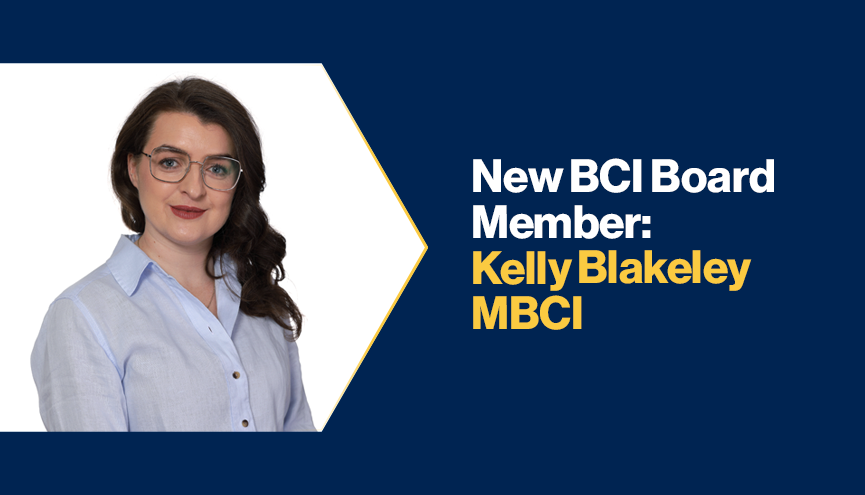New BCI Board Member: Kelly Blakeley MBCI

We are pleased to introduce Kelly Blakeley MBCI as a new Board Member for The BCI. In this spotlight interview, Kelly details her journey through the BC and Resilience sector so far and highlights the opportunities ahead.
Could you please tell us about your experience in this sector and how you got into Business Continuity (BC)?
My experience began in the public sector world of resilience, working as part of a Local Resilience Forum (the multi-agency partnership of responder organizations in England). These forums comprise of numerous emergency responders, local government, health trusts, infrastructure, the military, and utilities, etc. The work involved collaborative, multi-agency, large-scale exercises and planning for community emergencies, such as flooding, severe weather or animal disease. The role also involved working closely with the various national Government departments and structures. It was easy to become drawn into the passion of the sector in the context of this impactful work, where I met some of the many committed people that safeguard our communities. As my depth of knowledge developed, it became clear that underpinning all of this collaboration was the resilience of the organizations. I undertook a secondment in BC and my remit grew from there. Reviewing and resetting system processes, governance, building new stakeholder relationships, and taking a lead on organizational programmes but also new resilience related initiatives such as multi-agency cyber resilience planning.
After delivering training for the UK Government’s Cabinet Office Emergency Planning College (EPC) as an Associate, I was offered a full-time position. Here, I oversaw a portfolio of training and advisory services as a Resilience Capability director, with BC and organizational resilience at its core. I worked closely with Government colleagues and responder leads from across the UK and internationally. I was always fascinated by the stunning campus and its heritage in the very roots of resilience in the UK — dating back to almost a century ago.
More recently, a drive and ambition to continue to learn new things and seek new opportunities meant that I couldn’t say no when I was approached to take up a new role at the UAE Government’s Rabdan Academy as a subject matter lead for their BCM vocational portfolio. I have faced many new challenges so far and I am looking forward to what this new personal and professional journey holds.
What role has the BCI played in this journey?
Since first attending regional BCI Chapter events, I’ve had involvement with the BCI from various angles but the main outcome for me has been providing access to other BC professionals, whether that be through Chapter events, conferences or more technical work. I’ve been involved with the BCI as a:
- BCI Training Partner contract lead at the UK Government’s Cabinet Office EPC.
- BCI Approved instructor
- Member
- Regional Chapter committee member
- Representative at annual BCI Volunteers Conferences
- Technical reviewer
- BCI World Public Sector Stream Creator
- Mentor.
What has been some of your greatest challenges and successes in this industry?
Many of the challenges I have faced are similar to those faced by others and for organizations as a whole. In my opinion, some of the enduring challenges in this industry include:
- Lack of investment in resilience professionals
- Access to development opportunities and continued learning
- Lack of engagement in building resilient organizations. BC is commonly perceived as a compliance exercise that doesn’t receive the full engagement of leadership and people. Particularly in the face of today’s ‘permacrisis’. This leaves organizations open to worse impacts which can have devastating consequences. Out of better risk and resilience comes better sight of opportunities for individuals, organizations, and societies.
- Lack of empowered diversity. It is no secret that, with regards to leadership positions in resilience related roles, the balance is out. To improve how we collectively approach today’s challenges, we need to seek out those with diverse perspectives.
In parallel to this, we are also seeing a new evolution of technology and its integration into the core of our society. As much as it will be difficult for organizations to know everything as it develops, they should try to take an approach of humility and gain some awareness of what they don’t know. In my view, there is a gap between our core resilience skills and misinformation and the digital ‘infodemic’, for example.
Successes
I am proud of the opportunities I have taken up and what I have achieved so far. However, I know there is still so much that can be done. To date, the achievements that come to mind include:
- COVID-19 Responder Programme 2020: 6 months into a new role at the UK Government’s EPC coincided with the first COVID-19 lockdown in 2020. I took the lead on coordinating a programme when we were commissioned by the Government to deliver a COVID-19 Support to Responders Programme, using new state of the art online classroom technology. We delivered this to thousands of England, Scotland, Wales, and Northern Ireland’s emergency planners and resilience leads. These were people working through the pandemic for the emergency services, local government, and health trusts, amongst many others. I was so humbled by the positive response we received to this work at a highly challenging time for all involved.
- Working with the UK Government as a Resilience Capability director at the Cabinet Office’s EPC. I had taken my first EPC course shortly after starting out in emergency planning.
- Starting up my own company. For a time, I set up my own consultancy business, alongside a busy resilience practitioner role. This is often perceived as not something for female professionals, but I am proud of this venture and the entrepreneurial possibilities it opened up at the time.
- Moving overseas to work for an international government.
- Being elected as a BCI Global Board Director. I had wondered about applying for the Board elections before, but didn’t do it — probably due to imposter syndrome amongst other reasons. As much as I do think you should often take a leap of faith and grasp opportunities, I don’t think the time was right for me before. However, when the position became available this time, it felt right and I went for it. I was confident about my pitch, despite having written it while being sick with COVID, but I did not know it would be so successful. Thank you so much everyone.
Why have you decided to join the BCI Board?
I believe now is the time to utilise this diverse experience and input strategically to better support the resilience community. I feel I have a voice that provides a different perspective and I am looking forward to opening a new dialogue in this new role.
I feel I will bring new perspectives to the Board and the BCI. I am ready to input and help shape the sector from a new leadership position, on a global scale. I know the areas where members would like to see change, having experienced many of them myself. I know I will also learn much from this experience, and I hope I will have greater access to professionals who may be able to offer insight.
The timing right now is key. We have just experienced a pandemic and resilience is experiencing some real evolutions from a technical and appetite perspective. We continue to work through and refine the broad meanings of newer, less technically defined terms such as Organizational and Operational Resilience, which is commonly a topic of discussion on various platforms. There is also a greater need for sectors to collaborate to face the challenges we face. Now is such an interesting time as we start to work with the spotlight that resilience is under and start to define the new face of resilience/BC.
What strengths and experience will you bring to the BCI Board?
My background in science and having a curious mind means I often see things in a way that sticks to logic and practicality. I know of the importance of evidence and research, as well as the reality of how things work ‘in the field’. Additionally, I’ve seen resilience through the lens of it being related to life-saving activities, and recognised its criticality thereof. So I’m open to offering critical challenge when there is need or room to improve and innovate.
I’m of the perspective that our organizations are built of the people that work there, and so any systems need to have the human element built in by design. Healthy leadership, good governance and culture in an organization are integral to the resilience systems, so let’s consider that when we talk about BC as well.
Having worked with a broad range of professionals and delivered learning materials from national Government to local level, I also know the importance of making professional development accessible to a range of people. We all see things through our own perspectives and as long as it comes with some level of self-awareness, there is something great in that. For too long, there has been too much over complication and secrecy of the specialism. The profession and its skillset should be highly regarded, but to take the sector forward, we also need to provide access for wider than the usual settings to build personal, organizational, societal and global resilience.
What excites you about the future of this sector?
People in the profession: One of the key things that excites me about this sector are the people who make it what it is. Coming from the public sector, I know of many passionate individuals who strive to make a difference in the community, and ultimately in the world. I am looking forward to being more involved in a vehicle that has a role in bringing such professionals together and facilitating the ‘cross-pollination’ of ideas and opinions, to strive for innovation and resourcefulness.
Our role in facing the permacrisis: We as a sector have an important role to play in supporting each other, as well as helping our organizations and communities to build resilience.
Innovation: We are seeing some degree of shift towards an approach of diversity of thought and collective intellect. I think, more than ever, it is being recognized that a collaborative approach has significant benefits – particularly in innovation and change. Since my recent move overseas to work for the UAE Government at the Rabdan Academy, I am pleased that I can now represent a new area, and hopefully, new perspectives on the Board.
Advancing and evolving skills: From technology to the climate crisis, we now need to collaborate and seek new insights to recognize the skills gaps we have. If we do so, there is great opportunity there.
Is there anything else you want to add?
Thank you to everyone who has shown support in this election for myself, for my fellow new Director, and the whole process. It is key that we all feel our vote and our voice is valued in any process such as this. I am excited about the make up of this Board and I look forward to what we can achieve with you all.


